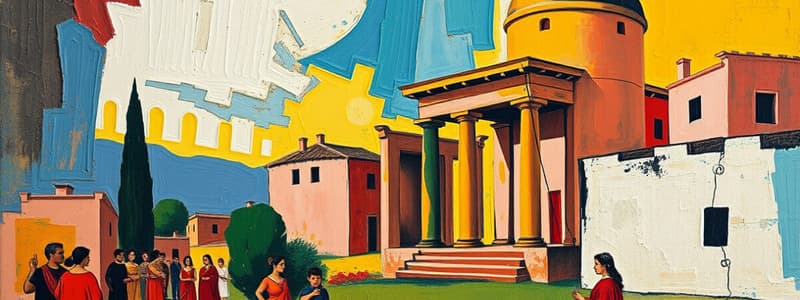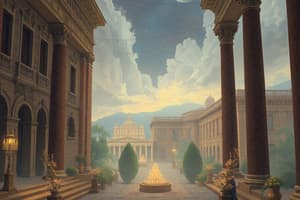Podcast
Questions and Answers
What are latifundia?
What are latifundia?
Huge estates owned by wealthy families
What problems did Roman expansion cause in the Republic?
What problems did Roman expansion cause in the Republic?
Created huge social gaps between the wealthy and commoners; small farmers could not compete with large estates and became homeless and jobless; urban poor class grew rapidly.
What were the seeds to the Republic's collapse?
What were the seeds to the Republic's collapse?
Corruption among the rich, discontent among the slaves, and resentment among the poor.
What is a triumvirate?
What is a triumvirate?
What is a civil war?
What is a civil war?
Who was Julius Caesar?
Who was Julius Caesar?
What is an absolute ruler?
What is an absolute ruler?
Who were Tiberius and Gaius Gracchus?
Who were Tiberius and Gaius Gracchus?
What happened after the deaths of Tiberius and Gaius Gracchus?
What happened after the deaths of Tiberius and Gaius Gracchus?
What is a mercenary?
What is a mercenary?
What characteristics made Julius Caesar successful?
What characteristics made Julius Caesar successful?
What caused Caesar's downfall?
What caused Caesar's downfall?
What reforms did Caesar make after being elected as forever dictator?
What reforms did Caesar make after being elected as forever dictator?
What happened after Caesar's death?
What happened after Caesar's death?
Who was Octavian?
Who was Octavian?
What was the second triumvirate?
What was the second triumvirate?
What was the Pax Romana?
What was the Pax Romana?
What was the success of the Roman Empire based on?
What was the success of the Roman Empire based on?
Who was Caligula?
Who was Caligula?
Who was Nero?
Who was Nero?
Who was Domitian?
Who was Domitian?
Flashcards are hidden until you start studying
Study Notes
Roman Expansion and Its Issues
- Latifundia were vast estates owned by wealthy families, contributing to economic disparity.
- Roman expansion created significant social gaps; small farmers struggled against large estates.
- Post-expansion, urban poor made up about 25% of Rome's population, leading to increased homelessness and joblessness.
Factors Leading to Republic's Collapse
- Corruption among the elite, coupled with discontent among slaves and resentment of the lower classes, fueled class tensions.
- The assassination of Tiberius and Gaius Gracchus marked the rise of violence in politics.
Key Political Structures
- Triumvirate is a political alliance of three leaders, influencing Roman governance.
- Civil wars erupted within Rome as military leaders vied for control, shifting loyalty from the republic to personal allegiances.
Julius Caesar's Rise and Fall
- Julius Caesar (100-44 BC) was a prominent general who transformed the Roman Republic and was named dictator in 46 BC.
- His military conquests, particularly in Gaul, and effective leadership earned him loyalty among soldiers and the populace.
- As his power grew, resentment from senators culminated in his assassination by figures like Brutus and Cassius.
Caesar's Reforms
- Caesar implemented reforms to grant citizenship to many, expanded the Senate, created jobs, and initiated land colonies for the landless.
- Increased soldier pay was a key aspect of his reforms, aimed at solidifying military loyalty.
Aftermath of Caesar's Assassination
- Following Caesar's murder, competition for power intensified leading to the formation of the second triumvirate.
- Civil wars ensued, resulting in Octavian (Augustus) emerging as the unchallenged ruler.
The Second Triumvirate and Pax Romana
- The second triumvirate included Mark Antony, Lepidus, and Octavian, marking a shift in power dynamics.
- Pax Romana refers to a two-century period of relative peace and stability in the Roman Empire initiated by Augustus.
Roman Empire's Success Factors
- The empire thrived due to a strong agricultural economy, effective governance, and peaceful successions among leaders.
Notable Emperors
- Caligula's reign (only four years) was marked by instability and eccentric behavior leading to his assassination.
- Nero (37-68), notorious for cruelty and luxury, is remembered for persecuting Christians and allegedly causing the Great Fire of Rome, despite economic prosperity under his rule.
- Domitian (81-96 AD), the last of the Flavian dynasty, is known for currency reforms and reinforcing the economy.
Studying That Suits You
Use AI to generate personalized quizzes and flashcards to suit your learning preferences.

